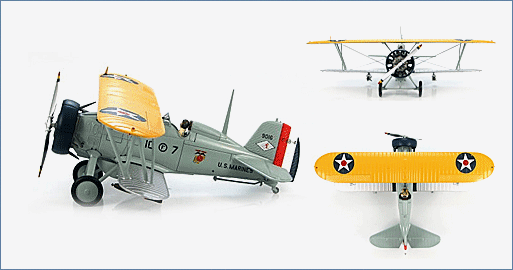Air Power Series>1:48 die-cast display model>F4B>HA7906
Boeing F4B-4 BuNo.9016 VF-10M, NAS San Diego, 1933

General Background
In the early 1930s Boeing developed a series of biplanes designated the F4B for the US Navy and US Marine Corps but was a P-12 for the US Army Air Corps. The aircraft were first accepted in 1929 and served as the primary fighter. The P-12 was built in 6 successful variants while the F4B had 4. The P-12 was replaced by the Boeing P-26 in 1934-35 but the F4B carried on with operational duties until the Grumman F2F/F3F series completely replaced them in 1938.
The Aircraft
On July 1, 1922 Fighter Squadron One was established as VF-1 Tophatters. On July 1, 1927 VF-1 became VF-1B and joined the USS Saratoga CV-3 in January 1928. It wasn't until 1933 when VF-1B received a few Boeing F4B-4 aircraft. In August of that year they are listed as having only three of this variant. On July 1, 1934 VF-1B was once again re-designated this time to VB-2B. In 1949, after several designation changes they finally became VF-14 that still exists today.
Specifications :
| Total Produced All Variants: | 586 |
| First Flight: | June 25, 1928 |
| Role: | Fighter Biplane |
| Powerplant: | 1 x Pratt & Whitney R-1340-16 WASP air-cooled 9 cylinder radial engine, 550 hp (410 kW) |
| Performance: | |
| Speed: | 189 mph (164 kts / 304 km/h) |
| Service Ceiling: | 26,900 ft (8,199 m) |
| Range: | 369 mi (321 nm / 594 km) |
| Weight: | |
| Empty: | 2,355 lb (1,068 kg) |
| Max Takeoff: | 3,611 lb (1,638 kg) |
| Dimensions: | |
| Length: | 20.08 ft (6.12 m) |
| Height: | 9.32 ft (2.84 m) |
| Wingspan: | 29.99 ft (9.14 m) |

